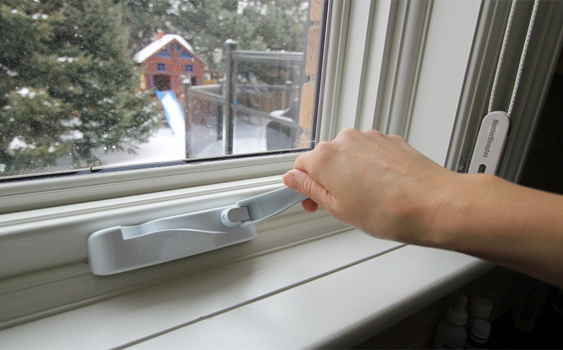Windows Care & Maintenance
Why Care & Maintenance is Important
New windows and older, existing windows want to work hard for you, to keep out drafts & moisture, to let the sunshine in, to provide views of the outside and to let in fresh air when needed. Windows care & maintenance is important for the sole purpose of keeping your long-term investment working for you! New windows have a hefty price tag when purchased with all the bells and whistles for energy efficiency, functionality & personality, and with regular upkeep, that initial investment and the investment of your time, will allow your windows to work at peak performance.
Inspecting Your Windows
 Not all windows are manufactured the same way or with the same materials, but a basic knowledge of what to look for when inspecting your windows for wear, damage, fixable issues and more, will greatly extend the life of your windows and keep them functioning properly. All windows with working parts and panes that open, require attention at least 4 times a year, especially in climates where there are four seasons. The framing around your windows and the materials they are made from, are also up for a keen eye inspection four times a year. For all window types, you will want to take notice of any condensation build up on your windows (moisture on the inside glass pane, between the panes or along the tracks), especially during changes in weather temperature. Next, you will want to take careful note of any parts that look damaged or are not moving the window correctly (parts like levers & cranks, springs & sashes). On a windy day, check for any drafts that may be entering in and around your window or your window framing, when the windows are in a closed and locked position. Look for any moisture build up or leaking around the framing (both indoors and outdoors), with tell-tale signs that will show by staining of moisture below the framing, on the walls or on the framing itself. The framing, depending on the materials used, may show signs of discolouring, cracking, denting, warping or moisture damage, take note of this as well. Your windows should be free of debris, clean, lubricated and in good working order.
Not all windows are manufactured the same way or with the same materials, but a basic knowledge of what to look for when inspecting your windows for wear, damage, fixable issues and more, will greatly extend the life of your windows and keep them functioning properly. All windows with working parts and panes that open, require attention at least 4 times a year, especially in climates where there are four seasons. The framing around your windows and the materials they are made from, are also up for a keen eye inspection four times a year. For all window types, you will want to take notice of any condensation build up on your windows (moisture on the inside glass pane, between the panes or along the tracks), especially during changes in weather temperature. Next, you will want to take careful note of any parts that look damaged or are not moving the window correctly (parts like levers & cranks, springs & sashes). On a windy day, check for any drafts that may be entering in and around your window or your window framing, when the windows are in a closed and locked position. Look for any moisture build up or leaking around the framing (both indoors and outdoors), with tell-tale signs that will show by staining of moisture below the framing, on the walls or on the framing itself. The framing, depending on the materials used, may show signs of discolouring, cracking, denting, warping or moisture damage, take note of this as well. Your windows should be free of debris, clean, lubricated and in good working order.
Proper Cleaning
 Windows care & maintenance is very easy and only takes a few minutes of your time when done at the turn of each season. Gentle soaps, warm water, soft rags and gentle glass cleaner are all you need to prep your windows for an oncoming season. The rule of thumb and a good habit to get into is…rinse, rinse and rinse so more! Quite often, homeowners wash their windows and framing with soaps and do not rinse well enough, which can have adverse effects. Rinsing the residue of any soaps very well will ensure that there is no residue to damage any parts of your windows. Never use any harsh chemicals, scratchy cloths or sponges and do not use acidic solutions like vinegar. Beginning with the insect screen, simply (and gently) pop it out and lay it onto a flat surface and using a mild soap & water, gently clean the screen and then rinse well under running water (allow to fully dry before returning to the windows). All glass surfaces, both in the interior and exterior, can be cleaned with a gentle soap & water, or, glass cleaner, with a soft, grit-free cloth (begin at the top and in circular motions, work your way down to the bottom, this will save on cleaning solution collecting in the bottom frame & working parts). This same cleaning method should be applied to exterior of windows too. Framing that is around your windows requires a little bit of extra special attention, and in order to clean them well, always remember to rinse away any and all mild soap residue BEFORE it has a chance to dry (this may cause damage, cracking or peeling of paint to surfaces if left to dry with soapy residue).
Windows care & maintenance is very easy and only takes a few minutes of your time when done at the turn of each season. Gentle soaps, warm water, soft rags and gentle glass cleaner are all you need to prep your windows for an oncoming season. The rule of thumb and a good habit to get into is…rinse, rinse and rinse so more! Quite often, homeowners wash their windows and framing with soaps and do not rinse well enough, which can have adverse effects. Rinsing the residue of any soaps very well will ensure that there is no residue to damage any parts of your windows. Never use any harsh chemicals, scratchy cloths or sponges and do not use acidic solutions like vinegar. Beginning with the insect screen, simply (and gently) pop it out and lay it onto a flat surface and using a mild soap & water, gently clean the screen and then rinse well under running water (allow to fully dry before returning to the windows). All glass surfaces, both in the interior and exterior, can be cleaned with a gentle soap & water, or, glass cleaner, with a soft, grit-free cloth (begin at the top and in circular motions, work your way down to the bottom, this will save on cleaning solution collecting in the bottom frame & working parts). This same cleaning method should be applied to exterior of windows too. Framing that is around your windows requires a little bit of extra special attention, and in order to clean them well, always remember to rinse away any and all mild soap residue BEFORE it has a chance to dry (this may cause damage, cracking or peeling of paint to surfaces if left to dry with soapy residue).
Proper Lubrication
The hardware or working parts of your windows do require lubrication from time to time to keep them in good working order. Cleaning the hardware can be done with a mild soap & water and a soft cloth, including the hinges, locks, handles, operating arms or hand cranks (make sure to rinse well without soaking the hardware with water). When it comes to lubricating the hardware (when completely dry and free of any dirt or residue), you can use lithium grease, automotive grease or even petroleum jelly (not petroleum-based lubricants!). Apply a small amount of lubricant to working parts, then use 3-4 times to work in the lubricant. When it comes to lubricating rollers and hinges, use a silicone based lubricant.